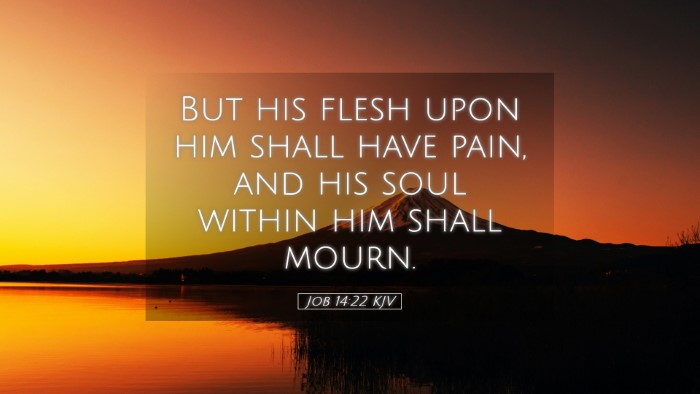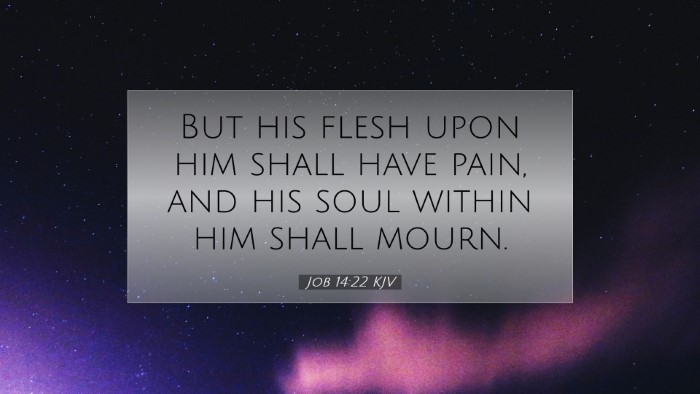Old Testament
Genesis Exodus Leviticus Numbers Deuteronomy Joshua Judges Ruth 1 Samuel 2 Samuel 1 Kings 2 Kings 1 Chronicles 2 Chronicles Ezra Nehemiah Esther Job Psalms Proverbs Ecclesiastes Song of Solomon Isaiah Jeremiah Lamentations Ezekiel Daniel Hosea Joel Amos Obadiah Jonah Micah Nahum Habakkuk Zephaniah Haggai Zechariah MalachiJob 14:22
Job 14:22 KJV
But his flesh upon him shall have pain, and his soul within him shall mourn.
Job 14:22 Bible Commentary
Commentary on Job 14:22
Job 14:22: "But his flesh upon him shall have pain, and his soul within him shall mourn."
Introduction
This poignant verse from the Book of Job encapsulates the essence of human suffering and the despair that often accompanies it. The context of Job's lamentation sheds light on the profound truths regarding mortality, suffering, and the human condition as interpreted by esteemed biblical scholars such as Matthew Henry, Albert Barnes, and Adam Clarke.
Contextual Analysis
Job's suffering is the backdrop for this verse. Throughout the book, Job grapples with the seemingly arbitrary nature of suffering and the silence of God in response to his afflictions. In this specific verse, Job articulates the duality of the human experience—physical pain contrasted with the inner anguish of the soul.
Insights from Matthew Henry
Matthew Henry emphasizes the reality of suffering as an unavoidable part of the human experience. He notes:
- The physical pain described by Job serves as a reminder of the fragility of human life.
- This pain is not merely bodily; it is profound, affecting the very essence of one's being.
- Henry points out that while the body may suffer, it is the soul that bears the brunt of despair. The anguish felt is deep and penetrating, illustrating the interconnectedness of physical and spiritual suffering.
Insights from Albert Barnes
Albert Barnes builds on Henry's insights, further examining the implications of Job's lament. He writes:
- Job articulates a universal truth: all human beings share in the experience of pain and sorrow.
- There is an emphasis on the inevitability of suffering, highlighting that it is an aspect of the human condition that cannot be escaped.
- Barnes interprets "soul within him shall mourn" as an indication of the soul's awareness of its circumstances, underscoring the idea that emotional and spiritual turmoil often follows physical affliction.
Insights from Adam Clarke
Adam Clarke also provides valuable perspective on this verse. He asserts:
- Clarke sees Job's expressions of pain as an acknowledgment of the reality of death and suffering, presenting a candid view of human vulnerability.
- He notes the moral implications of Job's suffering, suggesting that it invites deeper reflection on the nature of sin and mortality.
- Clarke emphasizes the psychological component of suffering—how it leads to internal mourning, further confirming that pain can transcend the physical and affect one's spirit profoundly.
Theological Implications
The exploration of Job 14:22 raises significant theological questions regarding the nature of God, the reality of suffering, and the hope of redemption. The insights provided by the scholars remind us that human suffering is not merely an inconvenience; it is a profound theological reality that invites believers to engage with God in their pain:
- Suffering compels believers to seek God, fostering a deeper relationship through shared despair.
- Job's lamentation invites reflection on the messiness of faith in the face of overwhelming sorrow, reminding us that questioning is a part of genuine faith.
- The community aspect of Job's experience highlights the need for compassionate engagement with those who suffer, advocating for Christian fellowship during trials.
Practical Applications
For pastors and theologians, Job 14:22 serves as a crucial reminder of the importance of pastoral care and the need to address the suffering of congregants:
- Textual reflection on Job encourages pastoral leaders to validate the pain of those who suffer and to provide a safe space for expressions of grief.
- It serves as an encouragement to assimilate suffering into the broader narrative of faith—one that anticipates hope and restoration in Christ.
- Engagement with Job’s narrative provides theological frameworks for discussing the complexities of suffering, imparting wisdom on how to navigate these conversations with compassion.
Conclusion
Job 14:22 expresses a foundational truth about the human condition: suffering is an intrinsic part of life that impacts both body and soul. The combined insights of Henry, Barnes, and Clarke encourage readers to grapple with these realities in light of their faith. As believers reflect on this powerful verse, they are called to acknowledge their pain, seek solace in God, and extend compassion to others who are on similar journeys of suffering and mourning.


